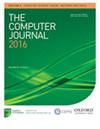重新审视软件高效流密码RCR-64和RCR-32
IF 1.5
4区 计算机科学
Q4 COMPUTER SCIENCE, HARDWARE & ARCHITECTURE
引用次数: 0
摘要
由Sekar、Paul和Preneel设计的同步流密码RCR-64和RCR-32分别是Biham和Seberry设计的同步流密码TPy和typy的增强变体。自2007年发布以来,RCR密码一直未被破解。在本文中,我们提出的论点不仅支持设计者的安全声明,而且建议,一般来说,密码对于几种类型的密码分析攻击是安全的。我们发现密码最好与256位密钥和384位iv一起使用。我们还提出了保护RCR密码的软件实现免受(缓存)定时和处理器标志攻击的方法。我们的性能评估表明,RCR-64的受保护实现加密长消息的速度与目前可用的一些最快的流密码相当。因此,我们发现RCR密码可能非常适合基于pc的应用程序,特别是流音频/视频应用程序。本文首次对RCR密码的安全性和性能进行了详细的研究。本文章由计算机程序翻译,如有差异,请以英文原文为准。
Revisiting the Software-Efficient Stream Ciphers RCR-64 and RCR-32
Abstract The synchronous stream ciphers RCR-64 and RCR-32 designed by Sekar, Paul and Preneel are strengthened variants of the ciphers TPy and TPypy (designed by Biham and Seberry), respectively. The RCR ciphers have remained unbroken since they were published in 2007. In this paper, we present arguments that not only support the designers’ security claims but suggest, in general, that the ciphers are secure against several classes of cryptanalytic attacks. We find that the ciphers are best used with 256-bit keys and 384-bit IVs. We also suggest ways to protect software implementations of the RCR ciphers against (cache-)timing and processor flag attacks. Our performance evaluation suggests that the protected implementation of the RCR-64 encrypts long messages at speeds comparable to some of the fastest stream ciphers available today. Consequently, we find that the RCR ciphers may be well suited for PC-based applications in general and streaming audio / video applications in particular. This is the first paper to present a detailed study on the security and performance of the RCR ciphers.
求助全文
通过发布文献求助,成功后即可免费获取论文全文。
去求助
来源期刊

Computer Journal
工程技术-计算机:软件工程
CiteScore
3.60
自引率
7.10%
发文量
164
审稿时长
4.8 months
期刊介绍:
The Computer Journal is one of the longest-established journals serving all branches of the academic computer science community. It is currently published in four sections.
 求助内容:
求助内容: 应助结果提醒方式:
应助结果提醒方式:


